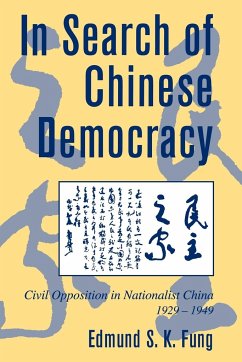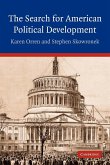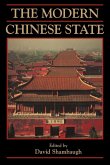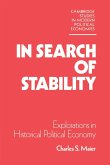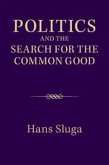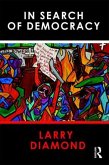Fung argues that the reasons democracy did not take root in China were more political than cultural.
Why modern China has been unable to institutionalize democracy is a long-standing topic of debate and the ultimate subject of this book. The greatest momentum for democracy, Edmund Fung contends, emerged between 1929 and 1949 with civil opposition to the one-party rule of the Guomindang. This analysis of China's liberal intellectuals and political activists who pursued democracy in the 1930s and 1940s, fills a gap in the historical literature on the period between May Fourth Radicalism and the Chinese Communists' accession to power. Fung argues that the reasons the growth of democracy was thwarted during this period were ultimately more political than cultural. The Nationalist era contained the germs of a reformist, liberal order, which was prevented from growing by party politics, a lack of regime leadership, and bad strategic decisions. The legacy of China's liberal thinkers can be seen, however, in the pro-democracy movement of the post-Mao period.
Review quote:
"This book by Edmund S. K. Fung builds on Andrew J. Nathan's Chinese Democracy (1986) with a fascinating history of liberal and democratic thought in the 1930s and 1940s, combined with a detailed study of the various democratic parties and institutions of the period...The book begins with an excellent introduction to the period...This book is at its best as a work of intellectual history...As a major contribution to our understanding of democracy in twentieth century China, it should be of interest to political scientists as much as to historians."
American Historical Review
"The book, on the whole, is well written and clear...In sum, this is an extremely interesting study of the 'hitherto little-known story'....It is a tour de force, a truly impressive piece of scholarship."
The China Journal
Table of contents:
Acknowledgments; Introduction; 1. The dictatorial regime; 2. Setting the opposition agenda: the issue of human rights, 1929-1931; 3. The National Emergency 1932-1936: Political and intellectual responses; 4. In defense of democracy 1933-1936; 5. An abortive democratic experiment: the people's political council, 1939-1945; 6. Wartime democratic thought; 7. The third force movement: the Chinese democratic league, 1941-1945; 8. 'Peace, democracy, unification, and reconstruction' 1946; 9. The last stand of Chinese liberalism; Conclusion; Selected bibliography; Glossary; Index.
Why modern China has been unable to institutionalize democracy is a long-standing topic of debate and the ultimate subject of this book. The greatest momentum for democracy, Edmund Fung contends, emerged between 1929 and 1949 with civil opposition to the one-party rule of the Guomindang. This analysis of China's liberal intellectuals and political activists who pursued democracy in the 1930s and 1940s, fills a gap in the historical literature on the period between May Fourth Radicalism and the Chinese Communists' accession to power. Fung argues that the reasons the growth of democracy was thwarted during this period were ultimately more political than cultural. The Nationalist era contained the germs of a reformist, liberal order, which was prevented from growing by party politics, a lack of regime leadership, and bad strategic decisions. The legacy of China's liberal thinkers can be seen, however, in the pro-democracy movement of the post-Mao period.
Review quote:
"This book by Edmund S. K. Fung builds on Andrew J. Nathan's Chinese Democracy (1986) with a fascinating history of liberal and democratic thought in the 1930s and 1940s, combined with a detailed study of the various democratic parties and institutions of the period...The book begins with an excellent introduction to the period...This book is at its best as a work of intellectual history...As a major contribution to our understanding of democracy in twentieth century China, it should be of interest to political scientists as much as to historians."
American Historical Review
"The book, on the whole, is well written and clear...In sum, this is an extremely interesting study of the 'hitherto little-known story'....It is a tour de force, a truly impressive piece of scholarship."
The China Journal
Table of contents:
Acknowledgments; Introduction; 1. The dictatorial regime; 2. Setting the opposition agenda: the issue of human rights, 1929-1931; 3. The National Emergency 1932-1936: Political and intellectual responses; 4. In defense of democracy 1933-1936; 5. An abortive democratic experiment: the people's political council, 1939-1945; 6. Wartime democratic thought; 7. The third force movement: the Chinese democratic league, 1941-1945; 8. 'Peace, democracy, unification, and reconstruction' 1946; 9. The last stand of Chinese liberalism; Conclusion; Selected bibliography; Glossary; Index.

